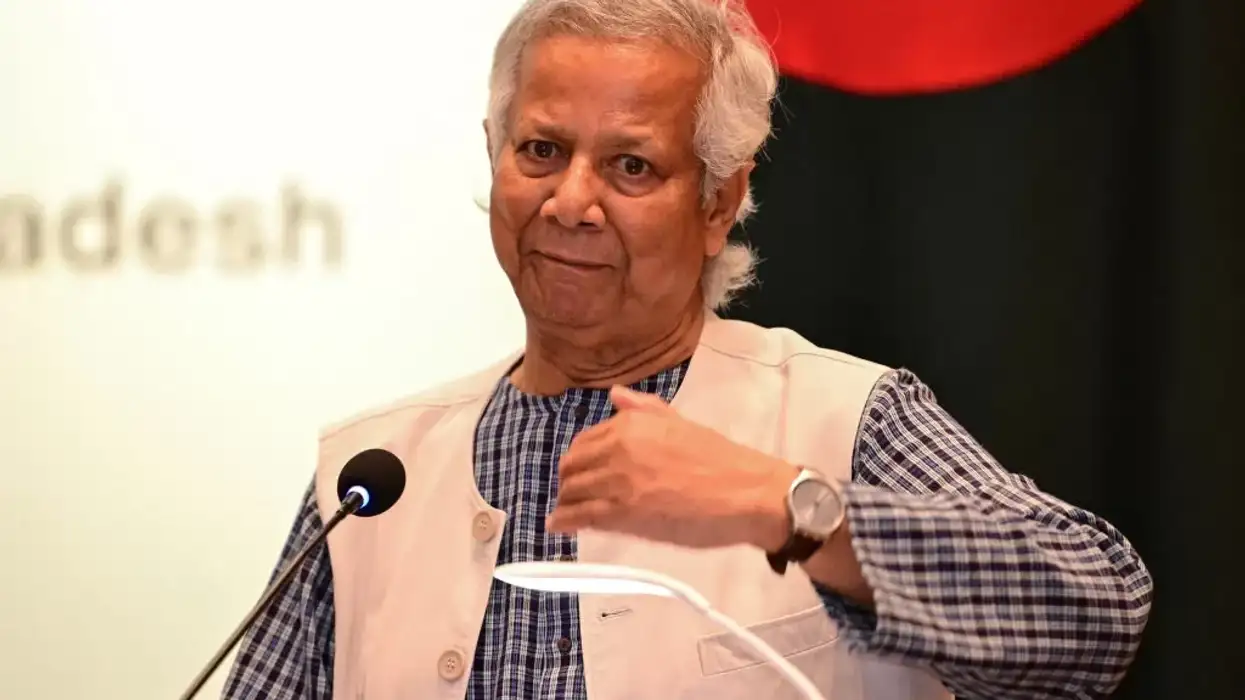BANGLADESH's interim leader Muhammad Yunus has urged the country's politicians to keep differences at bay and put up a united front to counter "Indian aggression".
The Muslim-majority nation saw a student-led uprising in August, toppling autocratic premier Sheikh Hasina and ending her 15-year rule.
India -- Hasina's biggest international patron and the destination of her exile -- has accused Yunus' administration of failing to protect minority Hindus, straining ties between the neighbours.
"They are undermining our efforts to build a new Bangladesh and are spreading fictitious stories," Yunus told a gathering of Bangladeshi political parties.
"They have spread these rumours in particular countries and among influential players."
Yunus urged politicians at the meeting to unite against what he characterised as a disinformation campaign, describing the matter as "a question of our existence".
Hindu monks protest to stop the atrocities against Bangladesh's Hindu minority community, in Kolkata on December 5, 2024. (Photo by DIBYANGSHU SARKAR/AFP via Getty Images)A caretaker administration headed by Yunus, a Nobel Peace Prize laureate, has been tasked with enacting democratic reforms ahead of fresh elections.
The chaotic aftermath of Hasina's ouster saw a smattering of reprisal attacks against Hindus and other minorities, based in part on their perceived support for her government.
Yunus's administration has acknowledged and condemned attacks on Hindus but said in many cases they were motivated by politics rather than religion.
It has accused India of exaggerating the scale of the violence and running a "propaganda campaign".
The meeting, Yunus's media team said, was part of an initiative to promote national unity in the face of "Indian aggression".
Yunus also met with student leaders on Tuesday (3) evening
Numerous street demonstrations have been staged against India in Bangladesh since Hasina's ouster as diplomatic relations have cratered.
Several rallies were held on Wednesday (4) to protest against an attempt by Hindu activists this week to storm a Bangladeshi consulate in an Indian city not far from the neighbours' shared border.
India has condemned the breach and arrested seven people over the incident.
Meanwhile, a Bangladeshi tribunal banned broadcasts of "hate speech" by Hasina on Thursday, weeks after indicting her over the killing of protesters during the August revolution that ousted her.
Bangladesh's International Crimes Tribunal (ICT) is investigating Hasina for "mass murder", among other charges, during the weeks of unrest that forced her to flee the country for neighbouring India.
"Sheikh Hasina is accused in several cases currently under investigation by the tribunal," prosecutor Golam Monawar Hossain Tamim told reporters.
"We sought a ban on disseminating her hate speech as it could hinder legal proceedings or intimidate witnesses and victims," he said, confirming the ICT had agreed to enact the ban.
"If her speeches continue to circulate, it will become difficult to bring witnesses to the tribunal."
It was not immediately clear what authority would determine which speeches by Hasina qualified as hateful or how the order would be enforced.
The decision came days after Hasina addressed a gathering of supporters in New York by videolink, accusing Yunus of "mass murder".
Hundreds of people were killed in the weeks prior to Hasina's ouster, most by police fire.
Scores more died in the hours after her toppling, largely in reprisal killings against prominent supporters of her Awami League party.
The ICT was set up by Hasina in 2010 to probe atrocities during the country's 1971 war of independence against Pakistan.
Over the following years it sentenced numerous prominent political opponents to death.
The court was regularly criticised by rights groups for not meeting proper trial standards and became widely seen as a means for Hasina to eliminate her rivals.
The interim government led by Yunus has vowed to push for Hasina's extradition from India to be tried by the tribunal.
(AFP)





